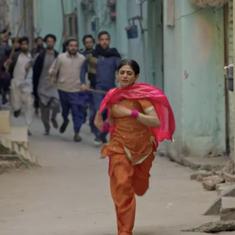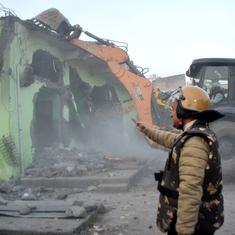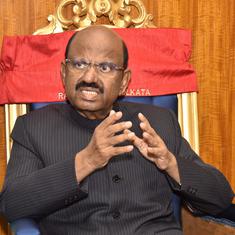In June, the Assam government demolished just over 600 Muslim homes in Goalpara district in what it described as a crackdown on “illegal encroachments”.
In Jahangirpuri in Delhi, homes and shops were razed despite a Supreme Court stay in April. The next month, the Ahmedabad municipality demolished 8,500 houses in Danilimda in a drive aimed at “illegal Bangladeshis”. The same month, in Saharanpur in Uttar Pradesh, a mosque under construction was demolished without warning.
Bulldozers have emerged as the state’s favourite weapon in Narendra Modi’s India, flattening Muslim neighbourhoods with clinical choreography.
Each such demolition redraws the geography of citizenship and belonging. Like Israel’s bulldozers in Gaza and the West Bank, India’s bulldozers flatten buildings while erasing memory, rewriting history and reinforcing majoritarian rule.
Italian philosopher Giorgio Agamben warns of the “state of exception”: legal limbo where democratic rights are suspended in the name of national interest.
Agamben’s “state of exception” is evident when citizenship is overridden by suspicion, when due process is abandoned and when the law is fashioned into a tool of punishment. The state that is meant to protect rights becomes an agent of violation.
“We lost everything in a day,” Fatima Begum, a mother of four in Goalpara told The Observer Post. “My children now suffer in the heat and rain. We only ask for dignity and safety.”
Dignity is precisely what is being denied, deliberately.
In Goalpara, the administration cited a 2021 land notification, claiming that the homes were located in a wetland. If that is true, why were only Muslim homes demolished? Were notices issued? What compensation was paid? Was there the basic recognition that these are landowners, labourers, teachers, children – citizens?
“This is not just an attack on property but on our identity,” schoolteacher Imran Hussain told The Observer Post.
The bulldozer, as the mascot of a majoritarian state, arrives after riots, militant attacks or just before elections. It performs collective punishment, collapses the law into spectacle and leaves behind silence. It is demographic engineering bearing a saffron flag.
The bulldozer is theology in motion. It enforces a belief that Muslims are intruders on Indian soil and their citizenship conditional.
As damning as the state’s actions is the near-silence or symbolic deflection of the so-called secular parties. In Assam, the Congress opposition leader wrote to Chief Minister Himanta Biswa Sarma of the Bharatiya Janata Party to halt the evictions and the police reportedly stopped an eight-member delegation from reaching the site.
But beyond this procedural tokenism, there has been no serious political reckoning, no sustained outrage. Not one senior national leader of the Congress, Rashtriya Janata Dal, Samajwadi Party or Trinamool Congress showed up. Apart from a few headlines, there was no press conference or protest.
There is now a quiet consensus across much of the political spectrum that Muslim suffering no longer warrants attention. The logic is cynical and dangerous: Muslims will not vote for the BJP anyway, so why speak? Why risk Hindu votes by opposing bulldozers? A few lone voices, like Communist Party of India (Marxist) leader Subhashini Ali, have spoken out. But most parties are mute, cautious or calculating, treating Muslim pain as a liability rather than a constitutional crisis.
This is the new arithmetic of Indian politics. Parties flaunt their Hinduness, visiting temples, reciting mantras, donning sacred threads, believing that if they just appear Hindu enough, political victory is certain.
However, Hindutva is not just a vote bank but a project of erasure. The more political parties pander to this script, the more they become like the Aam Aadmi Party in Delhi – hollow, spineless, and complicit.
The BJP may have started the bulldozer down this dangerous path, but it is the silence of the rest that propels it forward.
Much like the Zionist strategies in Palestine, where demolitions serve to fragment, displace and erase Palestinian presence, India’s Hindutva regime is scripting its own slow-motion Nakba.
Even the Supreme Court, which has declared such demolitions “totally unconstitutional”, is routinely ignored. When bulldozers move faster than law, what remains of constitutionalism?
More than a “Muslim issue”, this is a warning to every Indian. When citizenship becomes negotiable for one community, all are rendered vulnerable.
We are witnessing the emergence of a parallel era where excavators dictate justice and headlines normalise apartheid. Where displaced women are forced to give birth in plastic tents. Where children study in the shadows of debris. Where heatstroke deaths are accepted collateral in the war against an unwanted identity.
The bulldozer is an emblem of Hindu supremacy that leaves behind broken lives and the broken promise of equal citizenship. Listen to the sound of a republic disappearing: crumbling homes and the steady hum of machinery.
Ismail Salahuddin is a writer and researcher based in Delhi, focusing on Muslim identity, communal politics, caste, and the politics of knowledge, social exclusion and inclusive policy at Jamia Millia Islamia in New Delhi.










